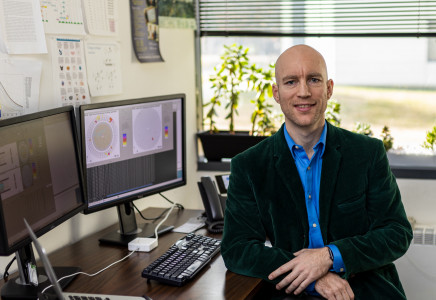Detector Expert Pushes Limits to the Edge of Reality
When one makes a list of South African sports, it is unlikely that snowboarding would make the cut. However, Jefferson Lab Staff Scientist Mark Macrae Dalton did not let geography stand in the way of pursuing the sport during his years at the University of Witwatersrand, where he earned his undergraduate degree, graduate degree and Ph.D.
A brief look at the South African native’s professional and personal pursuits showcases a spirit of possibility that leads Dalton to create opportunities where his interests guide him. Yet, unlike the classical picture of a trailblazer who forges new paths solo, Dalton’s endeavors are most often focused on team-driven activities, combining single components to create a seamless product.
Team painstakingly models experiments to simulate reality
Through his work as one of the lab’s staff scientists on the long-running GlueX project, Dalton is responsible for the smooth running of the experiment as well as helping to model it in the virtual world. As a detector expert, Dalton oversees the simulations for a detector used in the GlueX.
“I do work related to making sure this detector is functioning,” says Dalton. “It’s robust technology and I make sure it’s correctly calibrated,” he says.
Simulations can show that an experiment is viable before any additional time or money is committed to pursuing it, ensuring that a detector system is designed to capture the data that is needed for the experiment, for instance. Simulations may also help physicists to analyze data taken in an experiment or to better understand the implications of the data from an experiment.
“The lab is a $100 million a year facility, so beam time comes out to thousands of dollars a minute,” explains Dalton. “Something could happen to make the data more difficult than expected to understand. Simulations may be used to model any of the confounding issues so that the data is eventually understood.”
Accurately calibrating the model of an experiment to be an exact duplicate of the physical experiment takes extreme attention to detail.
“It’s critical that an experiment is well-modelled in the virtual world, so that when we run an experiment simulation, we get the exact same results as we would get in the physical world,” says Dalton.
Successful experiment takes grit and patience
The team has been working on the GlueX experiment for more than a decade. Dalton joined the lab just prior to turning the new equipment on.
“We took our first data in 2015, and we have taken data every year,” says Dalton. “We’ve completed phase one of the experiment, which was about 200 days of running. We now are entering phase two. We have upgraded the detector somewhat, and we are going to run at high luminosity and take twice as much data and run a few hundred days.”
Dalton notes that it can take decades to complete the full spectrum of an experiment.
“In addition to the GlueX work I’m doing, I am currently working on writing some ancillary papers from the Q-weak data from an experiment that was completed in 2012, illustrating how long it can take for an experiment to be ‘finished.’ Depending on the scale of the experiment, it can easily be more than ten years from when it is conceived to when it is completely over. It can even be 20 years.”
Bringing together voices to create something unique
Outside of work, Dalton takes the same patient, future-focused approach to his hobbies. While in his mid-thirties, he decided to devote some time to improving his singing voice.
“A friend of mine told me she was taking voice lessons and I thought, ‘Maybe it’s not such a bad idea to take singing lessons,’” he says. “I was thinking that I like to sing but that I wasn’t happy with my singing voice. I took some lessons and got more comfortable and then I thought I really want to sing and a choir would be the best way to do that.”
Dalton auditioned for and was accepted to the Newport News-based Virginia Choral Society, which has roughly 90 singers and performs three concerts each year. As with his professional work, Dalton appreciates that the team aspect of singing delivers a unique result that cannot be accomplished by a solo artist.
“When many voices come together, it creates something that a single voice can’t do,” he says. “Working with other musicians and a good conductor, I’ve learned a lot about singing that you can’t learn by yourself.”
Related Links
The GlueX Experiment
Jefferson Lab: Q-Weak: A Precision Test of the Standard Model and Determination of the Weak Charges of Quarks through Parity-Violating Electron Scattering
Jefferson Lab: Hall D Wiki


